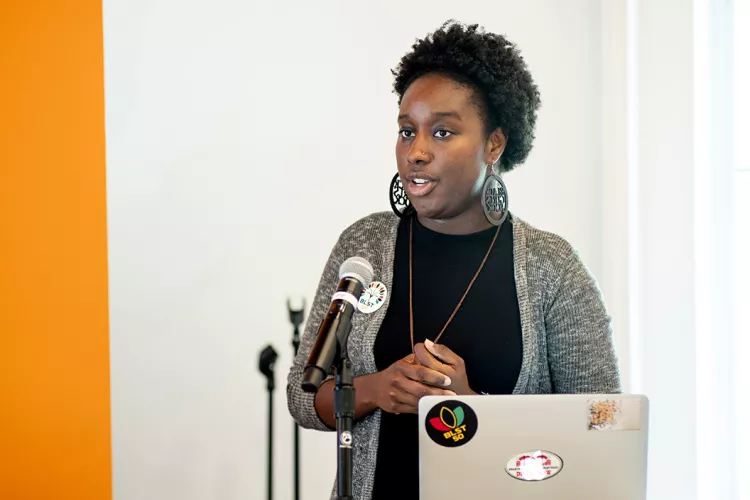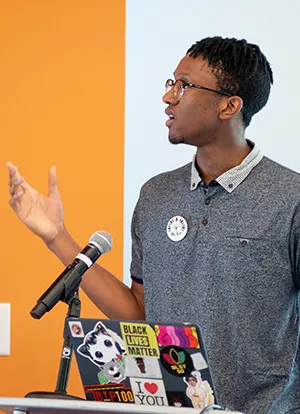Students Present Summer Research at Black Studies Program Lunch

Taylor Tucker ’20 presents her project, “Into the Masters’ Hands: The Carceral Captivity and Exploitation of Black Female Bodies in Schools and Beyond.”
Students, faculty, and staff members gathered on Friday for a Welcome Back Black Studies! event, hearing from two students in the Black Studies Program as they presented on their summer research projects.
This summer’s Petrucci Family Foundation Fellows, Taylor Tucker ’20 and Brandon Ekweonu ’20, presented their respective projects: “Into the Masters’ Hands: The Carceral Captivity and Exploitation of Black Female Bodies in Schools and Beyond” and “Hip Hop InFluence: The Fluency of Hip Hop as a Language for Communicating Consciousness and History.”
Associate Professor of English Literature Anthony Foy, the program coordinator for Black Studies, kicked off the presentations, held in the Hormel–Nguyen Intercultural Center at Sproul Hall. He stressed the importance of the students’ research, especially in the context of President Valerie Smith’s dedicating the year to Celebrating Black Excellence.
“For us, Black studies is a project that is variously intellectual, pedagogical, academic, and activist,” said Foy, “and Black minds matter in this field of knowledge production.”
Tucker’s research presentation, advised by Assistant Professor of Educational Studies Edwin Mayorga, focused on the storied experiences of Black girls in academia. By interviewing women and girls in the Chester area, she found that many Black women experienced alienation as a result of three factors: mental health trauma; “adultification,” or viewing Black girls as less innocent and more adult-like than white girls of the same age; and “the angry Black woman” myth, in which Black women are portrayed as ill-mannered by nature.
“For many of these Black girls, it’s about silence and not letting anyone know what’s going on in their home life,” said Tucker, an honors Black studies and educational studies special major from Marcus Hook, Pa., pointing to how often Black women and girls lack the proper resources and environment to voice their concerns freely.
Tucker was inspired to pursue this research after spending time at the Chester Community Charter School, where she found that many of the children made reference to a family member being incarcerated. She questioned what effects this could have on students’ mental health, but discovered that most research on the subject had focused broadly on children or boys, not girls specifically. Tucker is continuing her research by conducting more interviews, considering a Chester-based focus group, and exploring ways to make schools and academic spaces more suitable for Black girls.
Ekweonu then presented his research, advised by Visiting Assistant Professor of Religion James Padilioni. As a musician, beat-maker, and rapper, Ekweonu stated that hip-hop has been his main motivator through life, sparking his interest in researching an epistemological approach to the genre.

Brandon Ekweonu '20 presented his research, "Hip Hop InFluence: The Fluency of Hip Hop as a Language for Communicating Consciousness and History."
“As an example of Black people sharing information orally, it goes beyond just words. There's production and sound," says Ekweonu, a Black studies and computer science special major from Long Island City, N.Y., explaining hip-hop’s intricate, multifaceted nature and history.
His thesis that hip-hop communicates knowledge was laid out in three parts: by hip-hop’s ability to express ancestor worship, in the context of Afrofuturism, and through the connection between the vinyl record and the cosmogram found in the Kongo culture.
To illustrate his first point, Ekweonu found references to Black history as a lyrical commonality throughout hip-hop. One example came from the song “Nina” by North Carolina rapper Rapsody: “And still we persevere like all the 400 years of our own blood, Africa, old panthers lookin’ back like who gon’ come up after us?”
On the production side, “we time-travel through music,” Ekweonu notes, citing rapper Common’s track “Time Travelin’ (A Tribute to Fela)” as a prime example. The song bounces between traditional jazz-sounding horns to futuristic beats and synthesized lyrics, demonstrating an ability for rap music to reference both past and future.
Ekweonu pointed to the Kongo cosmogram, a circular symbol of the continuity of life, and the vinyl record as visual representations of his last two points—how each represents a connection between the past and future and the physical and spiritual. He concluded his presentation with an original sample, mixing singer Sibongile Khumalo’s “Untold Story,” a song made in remembrance to the apartheid in South Africa, as a collective example of his research.
Learn more about Celebrating Black Excellence at Swarthmore College: Honoring Our Past, Imagining Our Future.



